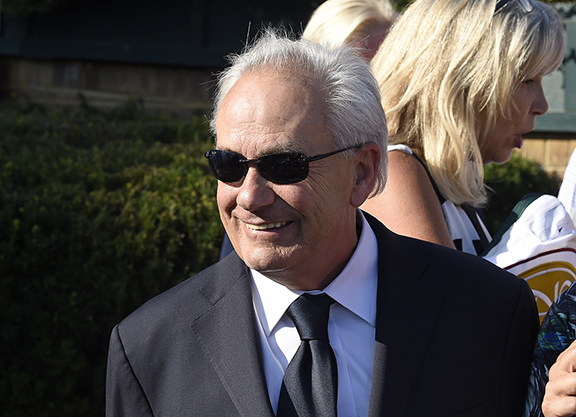By Dan Ross
Trainer Jerry Hollendorfer has lost the first phase of his legal tussle against the Los Angeles Turf Club and The Stronach Group (TSG) controlled subsidiary owners of Santa Anita Park, according to a ruling filed Apr. 29 in the Los Angeles County Superior Court of California.
The bifurcated non-jury trial, conducted between Apr. 4 and Apr. 6 this year, focused on a single declaratory relief cause of action, encompassing the proper legal interpretation of the race-meet contract between the California Thoroughbred Trainers (CTT) and the track. In all, Hollendorfer has filed seven causes of action against the owners of Santa Anita.
In his ruling, judge Maurice Leiter found that Hollendorfer has no standing as a third-party beneficiary to seek a legal declaration of his rights under the race-meet contract in effect when he was barred from all TSG-owned facilities in June of 2019. Only the CTT could pursue these rights under that race-meet agreement on the trainer's behalf, the judge decided.
TSG banished Hollendorfer from its facilities after four of the trainer's horses were catastrophically injured during Santa Anita's ill-fated 2018-2019 winter/spring meet, when the track experienced a well-publicized spike in equine fatalities during an unusually wet spell.
According to Drew Couto, Hollendorfer's attorney, the judge's ruling “has no bearing on the remaining six causes of action in phase two” of the trainer's legal battle.
A date setting conference for that second part of the trial has been scheduled for June 6. Phase two of the trial will involve a jury.
The TDN reached out to attorney Richard Specter, representing the Los Angeles Turf Club, for comment on the decision, but received no response before publication.
Phase one of this bifurcated trial included this key question: Could Hollendorfer seek declaratory relief under the race-meet agreement–a contract governing various aspects of a race-meet including stall assignments, first post times, stabling and track safety–negotiated between the track and the CTT on the trainer's behalf?
“Plaintiff is not a party to the RMA, but he claims he is a third-party beneficiary of that agreement and may seek a declaration of his rights under it,” the judge noted, in his ruling.
In his reasoning, the judge cited as precedent the 2006 case, Goonewardene vs. ADP, LLC, in which the plaintiff employee sued their employer for wages, but was not permitted to sue the independent payroll company the employer had hired to manage its payroll.
“The Court concluded it is not enough to show that the contracting parties (the employer and the payroll company) intended to benefit the employee; the employee also must show that 'permitting the third party to bring its breach of contract action against a contracting party is consistent with the objectives of the contract and the reasonable expectations of the contracting party,'” the judge wrote.
The Court's reasoning in that case, wrote judge Leiter, was that parties to a contract typically focus on the “terms of performance” as opposed to the “remedies” in the event of a breach of contract.
“This element of the third-party beneficiary analysis, then, 'calls for a judgment regarding the potential effect that permitting third party enforcement would have on the parties' contacting goals, rather than a determination whether the parties actually anticipated third party enforcement at the time the contract was entered into,'” the judge wrote.
In the end, the judge found that the track and the CTT “did not intend” the race-meet agreement to be enforced by individual trainers.
“Instead, they established an enforcement mechanism in which an individual trainer's grievances would be pursued by the CTT, acting on behalf of the trainer, if CTT determined the trainer's complaint was meritorious,” the judge wrote.
When contacted about the judge's decision, Alan Balch, the CTT's executive director, said the organization doesn't comment on ongoing litigation.
The ruling could potentially have a bearing on the outcome of long-gestating, ongoing negotiations to revise the race meet agreement contract currently used in California.
The TSG's actions in 2019 have led to a reversal of fortunes for the formerly numerical powerhouse trainer. According to Equibase, Hollendorfer trained 35 winners and earned $1,619,956 in prize money last year. In 2018, he trained 176 winners and accrued $7,191,756 in prize money.
A court filing from late last year states that Hollendorfer's stable has shrunk from more than 120 horses in California to an average of just 10, with another 25 to 30 horses traveling between three to four other states.
Hollendorfer is juggling several other related lawsuits. The trainer filed his initial lawsuit against the Pacific Racing Association–the corporate operators of Golden Gate Fields–on Aug. 12, 2019, in Alameda County Superior Court. That case is similarly ongoing.
Hollendorfer is also engaged in ongoing litigation against the CHRB and the Del Mar Thoroughbred Club. These cases are being heard in the Superior Court of San Diego County.
Not a subscriber? Click here to sign up for the daily PDF or alerts.






